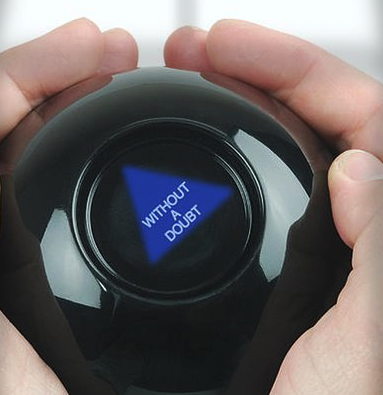But do I really know?
I’m looking out my window and I see a sheep on the hill across the harbour. I believe there is a sheep on the hill but do I know it?

Until recently, philosophers would have said that there are three conditions that need to be met before a belief can be considered knowledge.
First of all, I have to believe it. If I don’t believe there is a sheep on the hill, then I certainly don’t know it. Duh!
Second, it has to be true. If that sheep is not actually a sheep — if it’s actually a dog that looks like a sheep — then I don’t really know it after all. I believed it, but I was wrong.
Third, my belief has to be justified. Let’s say my curtains are closed and someone asks me if there is a sheep on the hill. I consult my Magic 8 Ball and it tells me ‘Without a doubt’, there is a sheep on the hill. Does my Magic 8 Ball justify my belief? Of course not. My Magic 8 Ball is not a source of knowledge and I am not justified in believing what it tells me even if what it tells me is true.

In summary, a belief counts as knowledge if it is a justified true belief — or just JTB for short.
JTB was the standard account of knowledge until the 1960s when Edmund Gettier found some scenarios where a belief is true and justified but doesn’t count as knowledge. Let’s go back to my sheep.
I’m looking out my window and I see a sheep on the hill across the harbour. I say ‘There is a sheep on the hill and I know it’.
But! It turns out that the sheep is actually a dog that looks like a sheep. It’s not true.
But, wait!! There is actually a sheep that I couldn’t see — it’s right behind the dog. There IS a sheep on the hill, just not the one I thought I saw. I knew there was a sheep on the hill!
According to Gettier, I did not know that there was a sheep on the hill. My reason for believing it was justified, even though my evidence turned out to be false. My belief was justified and true but it was not knowledge because it was only true by a lucky coincidence. According to Gettier, this shows that the justified true belief account of knowledge is insufficient. Gettier came up with several problems like this (he didn’t actually come up with the sheep problem but Gettier’s scenarios are horribly contrived and convoluted). These problems are referred to as Gettier Problems. These problems have kept philosophers busy for the last fifty years.
Here’s another example.
Imagine that we are seeking water on a hot day. We suddenly see water, or so we think. In fact, we are not seeing water but a mirage, but when we reach the spot, we are lucky and find water right there under a rock. Can we say that we had genuine knowledge of water? The answer seems to be negative, for we were just lucky.
(Dreyfus in Stanford Encylopedia of Philosophy)

According to the Stanford Encyclopedia of Philosophy (SEP),
A lesson of the Gettier problem is that it appears that even true beliefs that are justified can nevertheless be epistemically lucky in a way inconsistent with knowledge.
(SEP)
SEP says that our choices are to either accept Gettier’s challenge and look for a fourth condition to add to JTB or to challenge Gettier’s claim that the beliefs in Gettier Problems are actually justified.
For me, the idea that my belief that I saw a sheep was justified because I saw a dog that looked like a sheep is, to use philosophical terminology, absolutely nuts. Likewise, ‘mirage in the desert’!? Everyone knows not to trust a mirage. In neither case was the belief justified and, according to me, Gettier is wrong. The lucky beliefs in Gettier Problems are not justified and JTB survives as a sufficient account of knowledge.
But what does it mean for a belief to be justified?
Put Gettier problems to one side for a moment and think back to the simple case at the top of this post. When I mistook the dog for a sheep, my belief wasn’t knowledge because it wasn’t true. So was I justified in believing something that was not true? I thought I had evidence to support my belief but the evidence turned out to be wrong. I maintain that my belief was not justified. I needed more evidence to be sure.
So how much evidence do I need to justify a belief?
Philosophers are pretty much resigned to the idea that we can’t be 100% certain of any truth except for a few exceptional cases such as geometry and things that are true by definition (like, all bachelors are men). Even if I saw a million white swans, I couldn’t know for certain that all swans are white because someone might nip off to Australia and find me some black swans.

The best that we can hope for is to have enough evidence to justify a belief for now and we can revisit our belief if some new evidence turns up later. Let’s call it ‘provisional knowledge’. Maybe all knowledge is provisional?
But how much evidence is enough?
I don’t get to make the rules but I like the standard used in criminal law: to convict someone you have to have evidence beyond a reasonable doubt. Sometimes, the court gets it wrong because they were mistaken about the evidence — like, they thought the dog was a sheep or the witness saw a mirage — but if they do get it wrong, they go back and retrospectively admit that their belief was not justified. Philosophers should do the same.
Gettier Problems are not problems. Knowledge is justified true belief.
